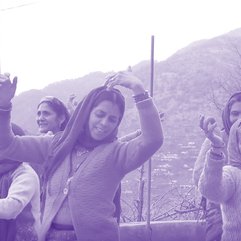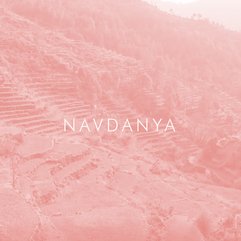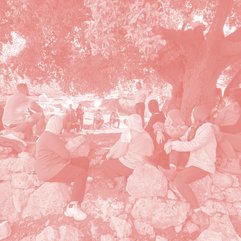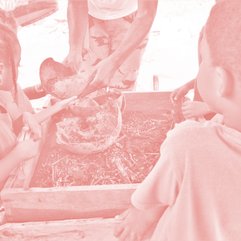Present Continuous: On Palestinian Land, Labor and Economy
This is a two-day symposium on the political economy of Palestine and the reconstruction of Gaza
10.00-21.00
10.00-21.00
Save the Date
for adults and children older than 14
in English

Amid 20 months of bombing and ongoing genocidal violence against Palestinians in Gaza, this two-day symposium seeks to critically engage with the political economy of Palestine and the violent imaginaries of some of the proposed reconstruction plans of Gaza.
Present Continuous explores the present realities of bulldozer capitalism: where real estate speculation, destruction of land, techno-centric planning, and the genocidal logics of settler colonialism converge. By tracing these patterns of capital accumulation, the symposium will attempt to reconcile how this extends legacies of colonial domination and economic, spatial control over people, land, and resources of Palestine. The program will invite participants to reflect on the role of international actors—including Western states—in structuring both the historical and ongoing dynamics of the region through long-standing structures of exploitation, de-development of Palestinian industries and agricultural production, and militarization.
Through panels, workshops, and artistic interventions, Present Continuous offers the space to discuss how the prisms of land, labor, industry, energy, and infrastructure can help us understand the economic architecture of the occupation over the past century, while reflecting on how these logics of economic domination have been resisted and are being reimagined for alternative futures.
People of all backgrounds are warmly invited to join the symposium.
The symposium is organized by Jule Ulbricht and Gale Raj.

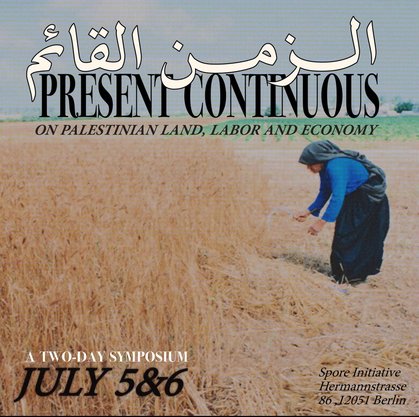
Day one: Saturday, 5 July 2025
10:00 am Opening Notes
by Mohammed Abdallah and Jule Ulbricht
10:30 am Panel
Imperial Continuum: Palestine and the Region
with Sherene Seikaly and Raja Khalidi, moderated by Lama El Khatib and Joud Al Tamimi
How can we understand Palestine within a larger history and infrastructure of imperial formations? How have forms and practices of popular sovereignty persisted against the mechanisms and claims of totalizing imperial powers? At this conjuncture of ongoing genocide in Gaza and expanding extraction of land and resources in Palestine, this panel attempts to think and rethink the political economy of imperial investment in Palestine and its surrounding region as well as present and potential modalities of anti-imperialist organizing.
12:00 pm Lunch
Cooking in Gaza under Genocide A Resistance of Flame and Fragrance
with the Palestinian Cooking Club
In Palestine, the kitchen has become more than a place of nourishment—it is a battlefield of memory, survival, and resistance. Under the shadow of genocide, where homes are reduced to rubble and families fragmented, the simple act of cooking takes on extraordinary meaning. Recipes passed through generations are preserved not only in taste, but in the courage of those who continue to prepare them amidst blockade, bombardment, systematic starvation and grief.
2:00 – 4:30 pm Working Sessions
Unpacking Energy Imperialism
by WeSmellGas, Global South United & Klima4Palästina
This workshop explores energy imperialism and its intersections with climate justice, racial capitalism, and Palestine. Together, we will reflect on how fossil fuel extraction, militarized infrastructure, and corporate complicity—such as by Siemens and Allianz—tie into global systems of oppression, from the Gulf to Palestine. The session will begin with a collective reading and discussion, followed by a historical overview and an activist-led fishbowl conversation.
2:00 – 4:30 pm Working Sessions
Learning from and with the Palestinian Diaspora in Berlin: Labor, Power, and Organizing
Together, we will explore the histories and ongoing realities of Palestinians in Berlin, with a focus on labor, resistance, and organizing. We will trace the various waves of Palestinian migration to Germany and the shifting contexts of pro-Palestine mobilization, highlighting how anti-Palestinian repression is far from new. Practices such as surveillance, censorship, deportations, bans on assemblies, and the dissolution of student networks have long been present in Germany, and learning from and with those who’ve experienced them before is crucial for understanding where we stand today, and for working towards a more inclusive and grounded form of solidarity.
4:30 Break
5:00 pm Panel
Political Economy of the Reconstruction Plans and Notes Towards Palestinian Liberation
with Nora Ragab (Palestine Speaks), Kareem Rabie, Mandy Turner and Mezna Qato, moderated by Sobhi Samour
7:15 pm Study Session
Unsettled Earth, Study Session with Joud Al Tamimi and Lama El Khatib
Rooted in collaborations with grassroots agrarian initiatives and collectives in Palestine organizing around defense of land, communal autonomy, and ecological recovery, Unsettled Earth explores practices and infrastructures that construct relations of land and life anew amid ongoing settler-colonial violence and ecological catastrophe. This study session will engage selected works from the exhibition connecting to the questions posed by Present Continuous at the intersection of Palestinian land, political economy, and labor.
9:00 pm Closing
Day two: Sunday, 6 July 2025
11:00 am Panel
On Palestinian Land & Labor
with Faiq Mari, Riya al’Sanah (Workers in Palestine), and Sai Englert, moderated by Jule Ulbricht
The intertwined struggles for land and labor have been inseparable from Palestinians resisting the long arc of settler colonialism and the shifting terrain of class politics.
We ask how Palestinians confronted Israel’s racialized labor hierarchy: from early Labor Zionism’s strategies of “conquest of land/ labor”, the 1970s influx of migrant workers to the current condition of surplus labor through work permit regime and incarceration as “counterinsurgency”.
Anchored in revolutionary tradition – from fida’i movements, Intifada collectives to today’s cooperatives – we situate the Palestinian struggle within a longer historical trajectory of agrarian movements and working-class politics. We examine strikes as well as global workers solidarity as both inheritance and necessity, confronting the strategic challenges of settler-colonial capitalism and the inseparability of people’s and land’s liberation.
12:30 pm Lunch
Cooking in Gaza under Genocide: A Resistance of Flame and Fragrance
with the Palestinian Cooking Club
In Palestine, the kitchen has become more than a place of nourishment—it is a battlefield of memory, survival, and resistance. Under the shadow of genocide, where homes are reduced to rubble and families fragmented, the simple act of cooking takes on extraordinary meaning. Recipes passed through generations are preserved not only in taste, but in the courage of those who continue to prepare them amidst blockade, bombardment, systematic starvation and grief.
2:30 – 4:00 pm Working Sessions
Iran Contra English
For the past twenty months, Benjamin Netanyahu has signed off his video addresses to the people of Iran with “Woman, Life, Freedom.” At the instance when the first Israeli bomb dropped on Iran, previous modes of expression, semiotics, rhetoric, and discourse for Iranians in the English language were foreclosed. What can be translated about Iran to English, in 2025, that is not at once captured and reified as military hardware? With the regime of rights at its final whisper, the institution of human rights revealed as a staunch culprit of genocide and war, the veil is lifted once and for all on the absence of this English-speaking addressee. This conversation invites those in diaspora and exile—particularly Iranians—to reflect on the question of appropriation and co-optation radically and militantly anew. The urgency of foreign invasion calls for radical strategies, tactics, and tools to resist and reverse the expropriation of the just and liberatory struggles and movements inside Iran and the MENA region. A consciousness around the political economy of language as media, and the grounds on which translation takes place, may be a starting point.
2:00 – 4:30 pm Working Sessions
Colonial Continuities: British Mandate Policies and the Foundations of Resource Extraction in Palestine
This workshop examines how British Mandate-era governance (1917–1948) laid the foundations for an extractive regime in Palestine. Through land laws, infrastructure concessions, and labor segregation, Britain institutionalised a colonial economy that prioritized Zionist interests and resource control. After a concise historical input, participants will engage with archival documents—land reports, energy concessions—to trace how legal frameworks enabled dispossession. By mapping continuities from colonial railroads to modern gas fields and fragmented energy access, the session reveals today’s energy imperialism as an extension of British-designed systems of domination.
2:00 – 4:30 pm Working Sessions
Cartographies of Reconstruction: Remittance Routes from Berlin to Gaza
by Academic Opposition and Bard College Berlin students
This workshop explores the personal and political geographies of remittances sent from Berlin to Gaza. As formal money transfer routes, upon which many families in historic Palestine rely, have been obstructed and impeded by Israel, as another means of daily harassment and international isolation, Palestinians in Berlin have had to navigate alternative routes to support reconstruction efforts back home. Together, we will map these remittance pathways as a communal practice – tracing both material flows and the settler colonial barriers that obstruct them. Through collective mapping, we will reflect on how these acts of care and resistance contribute to visions of reconstruction rooted in solidarity and shared struggle.
4:00 pm Panel
Weapons, High-Tech, and Genocide in Gaza
with Hebatalla Taha, Dimitra Andritsou (Forensis/ Forensic Architecture), and Nabil Hamdan (Academic Oposition), moderated by Gale Raj
Germany has been the second largest weapons exporter to Israel for decades. This panel will discuss the complicity by German companies and the German government to the genocide in Gaza by exposing the growing and clandestine arms trade between Germany and Israel and increasing publicly funded and thereby normalization of weapons research in German universities. This will be connected to the growth of the high-tech industry in Israel and its links to the military and technologies of war, occurring through the exploitation of Palestinian labor.
5:30 pm Break
6:00 pm Panel
Occupation by Infrastructure: Extractivism and the Fight for Energy Sovereignty in Palestine
with Munira Khayyat, Omar Jabary Salamanca, Mohammed Usrof, moderated by Baldeep Kaur
This panel confronts the violent role that infrastructure plays under Israeli settler colonialism, namely on how systems of energy, water, and resource extraction are used to dominate, fragment, and dispossess the Palestinian people. By focusing on the built environment and the invisiblised networks of power and resource flows, the presentations challenge conventional understandings of occupation by interrogating the role of regional actors and the embeddedness of Israel in imperialist logistical circuits. It asks: how do infrastructures become weapons of war and mechanisms of apartheid? How can landscapes devastated by settler colonialism and extraction be liberated and rebuilt? Finally, what forms of resistance—technical, political, and ecological—are emerging to counter these extractive logics?
7:30 pm Closing remarks by Toufic Haddad
8:00 pm “Dreamscape”: Screening of short films
by students from Al-Quds Bard College and Bard College Berlin
9:00 pm Closing
Bios of participants:
Academic Opposition: We are The Academic Opposition—a group of students and researchers active across German universities. We organize internationally to expose and end German academic complicity in the ongoing genocide against Palestinians. Our activism comprises militant research, political analysis and focused campaigns. Locating an urgent need to build long-term power and train student activists, we try to bridge gaps between cycles of activism and inter-generational handovers of political work.
Bahar Noorizadeh: Bahar Noorizadeh is an artist, writer and filmmaker. Her research examines the historical advance of speculative activity and its derivative politics in art, urban life, finance and economics. Noorizadeh is the founder of Weird Economies, an online art platform that traces economic imaginaries extraordinary to financial arrangements of our time.
Baldeep Kaur: Baldeep Kaur is an organiser from Academic Opposition. Their doctoral research studies how colonial power was historically consolidated during large-scale technological transitions and switches between resource regimes. Their research areas are History of Science and Technology with a focus on energy, Discard Studies and the Environmental Humanities.
Dimitra Andritsou: Dimitra is an architect and researcher. She has been working with Forensic Architecture / Forensis since 2019, where she has held a variety of roles, from advanced spatial and media research to setting up new office structures. In her work at FA/Forensis, Dimitra has coordinated and contributed to numerous investigations, ranging from right-wing racist terror and border violence to environmental racism and colonial legacies.
Faiq Mari: Faiq Mari is assistant professor at the department of architecture and planning at Birzeit University, Palestine. His work studies the spatiality of Palestinian anticolonial and socio-economic struggle, with a focus on collective labor and property therein. Faiq has practiced architecture and taught at Birzeit and Al-Quds Universities, he is also an editor of the magazine Arab Urbanism. His writings appeared in the Journal of Palestine Studies, Babelwad, and other journals and edited volumes.
Gale Raj: Gale Raj is a Professor of Politics at Bard College Berlin. Her research is focused on the impacts on economic development and labour of globalized electronics industries and its outsourcing and offshoring connections between the Global North and countries in Southeast Asia.
Global South United: Global South United is an anti-colonial, anti-capitalist, anti-fascist group based in Berlin, fighting for justice and liberation in the heart of the imperial core. It was incepted in October 2023, against the backdrop of the Zionist genocidal war on Palestine, and the increasing racist German crackdown on the pro-Palestine movement that followed.
Hebatalla Taha: Heba is an Associate Senior Lecturer at the Department of Political Science and the Centre for Advanced Middle Eastern Studies at Lund University in Sweden. Her research deals with intersections of political economy, technology, and war in the modern Middle East.
Joud Al Tamimi: Joud Al-Tamimi is an artist and curator. She studied Politics and Economics at the School of Oriental and African Studies (SOAS) in London. Her research focuses on anticolonial imaginaries, insurgent economics and psychoanalysis. She worked at Darat al Funun from 2019-2021, where she directed The Lab program and curated the trilogy: Internet of Things: Another World is Possible, Measuring Life: Notes Toward an Impossible Exchange and Postcolonial Ecologies. Currently, she is completing a fellowship at the Universität der Künste Berlin.
Jule Ulbricht: Jule Ulbricht is a historian and researcher. She is currently a doctoral fellow in the Global Intellectual History graduate school at Freie University and works on theories and histories of capitalism, war, labor and ideas of circulation in post-war global economy.
Kareem Rabie: Kareem Rabie is Associate Professor of Anthropology at the University of Illinois at Chicago. He is the author of Palestine is Throwing a Party and the Whole World is Invited: Capital and State Building in the West Bank, published by Duke University Press.
Klima für Palästina: Klima für Palästina is a group of climate justice activists who see justice for Palestinians as inseparable from climate justice and environmental justice. The group, which was formed in October 2023, recognises that Germany’s mainstream climate movement lacks inherent solidarity with Palestine, even though it is clear that there can be no climate justice on occupied land.
Lama El Khatib: Lama El Khatib is a writer and cultural worker researching histories of labour, conditions of debt and inheritance, and abolitionist practices.
Mandy Turner: Mandy Turner is an independent analyst affiliated with Security in Context as a senior researcher. Her most recent book was an edited collection From the River to the Sea: Palestine and Israel in the Shadow of ‘Peace’ (Rowman and Littlefield, 2019).
Mezna Qato: Mezna Qato teaches history at the University of Cambridge where she is also director of the Margaret Anstee Centre for Global Studies. She is completing a book on Palestinians and postwar regeneration. She co-convenes the Archives of the Disappeared Research Initiative, and is founding steering committee member of Librarians and Archivists with Palestine.
Mohammed Usrof: Mohammed Usrof is a Palestinian climate and political activist from Khan Yunis, Gaza. He's a research assistant at Georgetown University and an M.Sc student at UCD in Sustainable Development. His research revolves around the political economy of the Gaza Strip, environmental justice in the Middle East, Palestinian identity, and the NGOization of grassroots movements.
Munira Khayyat: Munira Khayyat is Associate Professor of Anthropology at NYU Abu Dhabi. She is the author of A Landscape of War: Ecologies of Resistance and Survival in South Lebanon (University of California Press 2022). Her writing has appeared in American Ethnologist, Public Culture, JMEWS, Cultural Anthropology, Anthropology News, HAU and a number of edited volumes. Khayyat was a Member of the School of Social Science at the Institute for Advanced in Princeton (2018-19). Before joining NYUAD in 2023, she taught at the American University in Cairo and the American University of Beirut.
Nabil Hamdan: Nabil Hamdan is a student of Environmental Science at the Technical University of Berlin and member of Academic Opposition — a group of students and researchers active across German universities.
Nora Ragab: Nora Jasmin Ragab is a German-Palestinian migration scholar based in Berlin. Her research interest lies in the intersections of diaspora mobilization, conflicts, and socio-political dynamics of displacement. She teaches courses on a diverse range of migration related topics and the international politics of the WANA region.
Raja Khalidi: Raja Khalidi, was trained as a development economist and has conducted research and published and lectured widely on Palestinian economic conditions in Lebanon, in the Arab region in Israel and in the occupied territories. He worked with the United Nations Conference on Trade and Development (UNCTAD) from 1985 to 2013. Since 2019 he has been Director General at the Palestine Economic Policy Research Institute (MAS).
Riya al’Sanah: Riya Al'Sanah is a Palestinian organiser with the Workers in Palestine initiative and a PhD candidate at the University of Exeter (UK), researching the financialisation of housing markets among 1948 Palestinians.
Sai Englert: Sai Englert is a lecturer at Leiden University in The Netherlands. He is the author of Settler Colonialism: an Introduction and the co-editor of From the River to the Sea: Essays for a Free Palestine.
Sherene Seikaly: Sherene Seikaly, Associate Professor of History at the University of California, Santa Barbara, the Editor of Journal of Palestine Studies, is a Fellow of the Wissenschaftskolleg in 2024/2025.
Sobhi Samour: Sobhi Samour is the Chair of the Social Science Division at Al-Quds Bard College in Jerusalem, where he also leads the program in Social Thought, Economy, and Policy. He holds a PhD in Economics from the School of Oriental and African Studies (SOAS), University of London. He has previously taught at Birzeit University and Bethlehem University, and has worked with the United Nations in Geneva and East Timor.
Taufic Haddad: Toufic Haddad is a Palestinian American academic, activist and author. He has worked in various capacities across the Occupied Palestinian Territories as a journalist, researcher, editor, and publisher, most recently directing the Kenyon Institute - the Council for British Research in the Levant's Jerusalem Branch. His 2016 book: “Palestine Ltd: Neoliberalism and Nationalism in the Occupied Territory” explores the role of neoliberalism and the World Bank during the so called ‘peace process’.
The Palestinian Cooking Club: The Palestinian Cooking club will be showing within 2 hours what it means to cook under the genocide in Gaza but is also a ride through the Palestinian cities and their interpretations of the Levantine cuisine.
WeSmellGas: WeSmellGas is a collective of organisers, researchers and filmmakers based in Northern Europe. They formed in 2022 around a shared framework: the overlapping crises we face today, including climate change, are fueled by a racial capitalist global economy, driven by empire and colonialism.
Workers in Palestine: -





